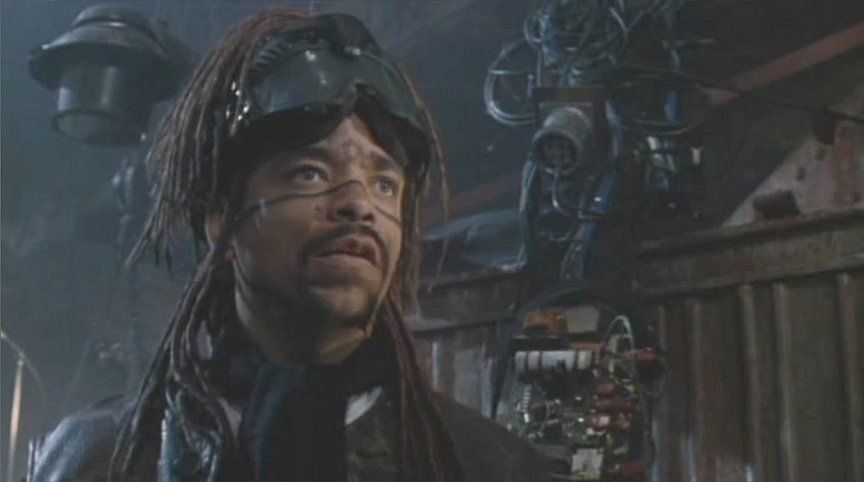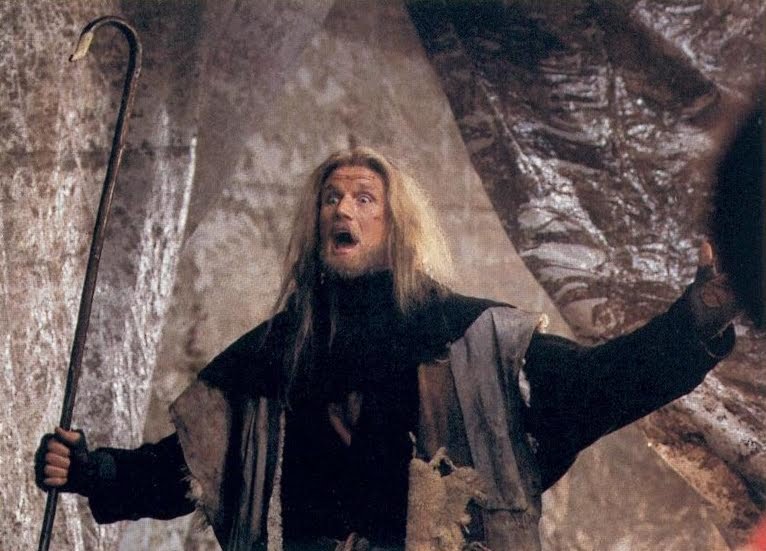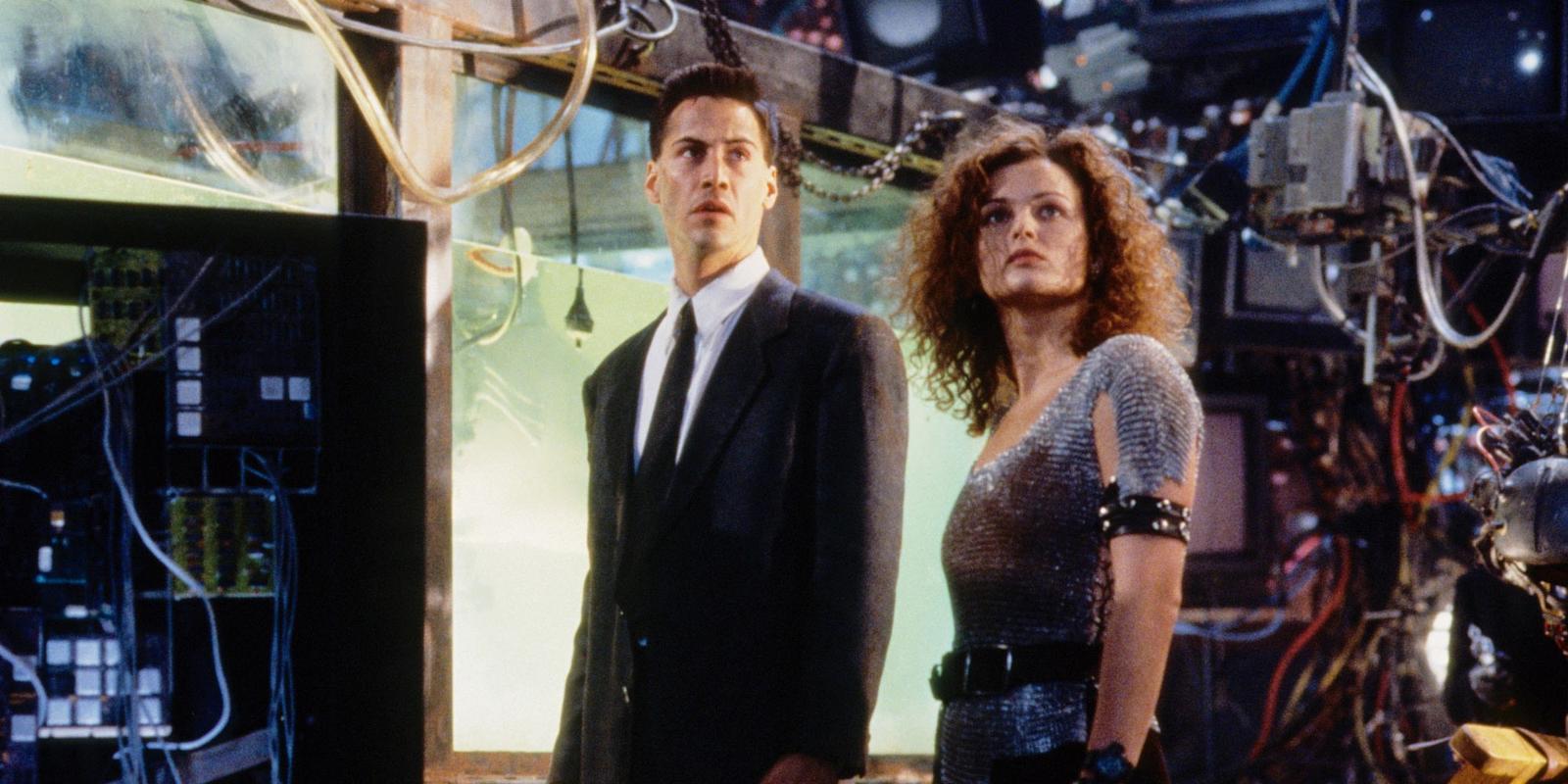
RETRO MOVIE REVIEW: Johnny Mnemonic
When it comes to science fiction movies, especially those set in the not-too-distant future, hindsight is very often 20/20. These kinds of films are very often educated guesses of what the future might be, extrapolated from the issues of the time when they were made. The result is often that when the year the movie is set in arrives, there can be a sense of disappointment (or relief, depending on how much we want that future to be reality). In the case of a film like Johnny Mnemonic, based on a short story by William Gibson, 2021 takes an interesting turn.
Johnny Mnemonic was not a well-received film during the mid-1990’s, and It’s been largely forgotten about even now. The movie takes place in a cyberpunk future of 2021, where data courier Johnny (played by Keanu Reeves) and his bodyguard Jane (played by Dina Meyer) must uncover the secret inside Johnny’s head before memory seepage kills him. The concept of the story actually works quite well for an action film, even if the execution doesn’t always live up to the idea. Moreover, this is a movie that raises some valid concerns about the world of its time, questions that still haven’t been properly addressed even all these decades later.

The film has aged surprisingly well over the past 26 years since it was made. The themes of technological addiction and how this is destructive to society are scarily relevant in a world of social media and Big Tech oligarchies. A story about factions struggling for control of information, maintaining dangerous secrets in a world ruled by corporations, feels like something that could be told today and not feel terribly different. Moreover, this film is ahead of the curve in some respects—the cure for a global pandemic as the film’s MacGuffin takes on a whole new light in a post-COVID world. William Gibson is generally regarded as the father of the cyberpunk genre, and his foresight as a science fiction author is noticeable in this script. Because of this, Johnny Mnemonic manages to be a better film now than when it was made, as it effectively addresses many issues that didn’t exist back in 1995.
The movie is, unfortunately, rough around the edges, and there are moments that didn’t age as well as some of Gibson’s timeless ideas. This is a movie about computer technology, and one might be forgiven for not predicting the future perfectly, especially where hardware is concerned. However, the idea of implanted system storage only being able to hold 160GB in a world where external hard drives can hold terabytes of storage would look silly by modern standards. The depiction of the internet as a “cyberspace” world of 3D polygons also didn’t survive the 90’s terribly well; VR today is much more sophisticated and realistic than 90’s CGI animation. The story also didn’t predict the spread of mobile smartphones, although it does correctly predict AT&T as a powerful force in telecommunications. Still, this movie came much closer than most films of the time likely would have, given its subject matter.

The cast of this movie is better than it was given credit for during its time. The Keanu Reeves in this movie is a younger, perhaps overeager actor and not the seasoned action star he’s become as of the John Wick films. Don’t expect any kind of performance of the John Wick caliber, though Reeves clearly is putting in the effort into his role as Johnny. His charisma does shine through even in those moments where he overacts, which happens occasionally, and we see the promise of his later performances in his role here. Dina Meyer is an actress I’ve always enjoyed in her various roles, from Birds of Prey to Starship Troopers to the Saw films, and she’s pleasant to watch here. It’s unfortunate that we couldn’t see Meyer as the Molly Millions character that Jane was based on, but as it is, she puts in a good effort as both an action heroine and the main love interest. Dolph Lundgren appears here in his last mainstream action role before his return in The Expendables, which is a shame, because he’s quite enjoyable here. His character, a cyborg street preacher turned assassin, represents the worst of technological excess, and Lundgren makes him an imposing and threatening villain. It’s also unfortunate that Lundgren doesn’t get more screen time, because I would have liked to learn more about this character. Ice-T also makes in an appearance as J-Bone, the leader of the Lo-Tek resistance group. Ice-T is a performer I have some respect for, and his personality and presence sell his role as a faction leader. All in all, the cast is quite solid, and none of these actors should be faulted with the poor performance of the film.
As an action film, Johnny Mnemonic reaches high, but it doesn’t quite reach its potential in the execution. Part of the problem is that this was a low-budget film by the standards of the mid-90’s, and a proper cyberpunk film would have needed a better effects budget. Only a few years later, The Matrix would illustrate the potential of how cyberpunk could work in modern filmmaking, including much more believable CGI effects showing what a “cyberspace” landscape might look like. Johnny Mnemonic, however, relies much more on practical effects, and that at times is preferable, especially during the action scenes, including the shootouts. Unfortunately, because of the low-budget nature of the film, the future feels generic, rather than timeless (Gattaca, for instance, pulls the “timeless future” aesthetic off much more effectively). The CGI effects in the cyberspace scenes also look a bit cheesy, especially by modern standards, and they likely weren’t that impressive even during the 90’s. To be fair, though, a strong enough story and performance can overcome even the most laughable visual effects. However, I don’t think it helped that the movie deviated from the original short story, which may have alienated hardcore Gibson fans. Some of the changes were regrettably unavoidable—for instance, the character of Molly Millions was unavailable due to rights issues, so Dina Meyer’s character became “Jane” instead. Still, the movie is enjoyable enough for all these concerns, and the plot never stumbles so much that the movie collapses under its own weight.

Some movies don’t succeed because the time was wrong for them, and to some extent, Johnny Mnemonic falls into this category. The movie is far more impactful today, despite some of its missteps, and it’s an important film to revisit in its twenty-sixth year. While this is certainly a flawed film that falls short in some aspects, it’s also a better film than its reputation deserves. Although Johnny Mnemonic is by no means a masterpiece of the genre, it is a mostly solid movie that helped pave the way for other cyberpunk films that came later. That is at least a worthwhile legacy, especially for a film that has improved with age.
Score: 3.5/5
Director: Robert Longo
Screenwriter/Story: William Gibson
Cast: Keanu Reeves, Dina Meyer, Ice-T, Dolph Lundgren, Takeshi Kitano, Henry Rollins, Denis Akiyama, Udo Kier, Barbara Sukowa
Author Profile
- Steve Sellers had been a fan of superheroes ever since Superman: The Movie. But it took the JSA, the Legion of Super-Heroes, Dragonlance, Lord of the Rings, Twilight Zone, and Chris Claremont's legendary run on the X-Men to make him a writer and a longtime fan of comics, fantasy, and science fiction. Steve is the co-creator of WHITE DRUID & MICHAEL NERO and GUARDIANS OF ELAYIM for Omen Comics, and he is also the creator of BLITZ and SHOCKWAVE for Revelation Comics (an imprint of Omen Comics).










